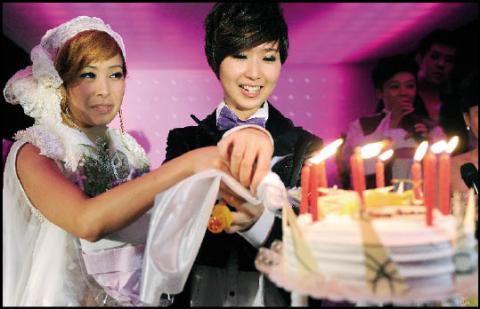About 80 lesbian couples tied the knot in Taiwan’s biggest same-sex “wedding party,” with organizers saying yesterday they hoped Taiwan would become the first place in Asia to legalize gay marriage.
Many of the couples donned white dresses and veils for the “Barbie and Barbie’s wedding,” which was held overnight in downtown Taipei, attracting about 1,000 visitors, including friends, relatives and curious onlookers.
“I feel very hopeful that Taiwan will legalize same-sex marriage soon,” said one of the brides, 32-year-old stylist Celine Chen, who plans a honeymoon in New York, which in June became the sixth US state to legalize gay marriage.

Photo: Sam Yeh, AFP
Even though same-sex unions are not allowed in Taiwan, the ceremonies — which had no legal force — went on smoothly without police interference or protests.
Many of the couples kissed, hugged and posed for photographs while receiving an unofficial certificate from the organizers that stated they were now “united in holy matrimony.”
The event climaxed with a couple exchanging rings and saying “I do” amid roaring cheers from the crowd. However, in a brief moment of sadness, some of the participants acknowledged that the marriages were not bona fide.
“The wedding party is fun, but it’s not real,” said Coral Huang, who has been with her partner for eight years and intends to go to Europe to wed legally. “Getting a genuine marriage certificate is very meaningful as it shows that we are being recognized and accepted.”
Gay marriage is not legal anywhere in Asia and although Nepal’s Supreme Court has approved it, no legislation has been passed in Kathmandu to put the ruling into effect.
Taiwan is becoming more open-minded toward its homosexual population and the country’s gay rights groups last year said they had hosted Asia’s biggest gay pride parade, with a turnout of 30,000 from at home and abroad.
In a 2008 opinion poll by the International Social Survey Programme, a global network dedicated to social science research, 17.5 percent of Taiwanese participants said that homosexual behavior was “not wrong at all.”
While significantly lower than the US, where 32.3 percent held that view, it was much higher than the 5.5 percent in Japan and 4.4 percent in the Philippines.
The Cabinet in 2003 drafted a controversial bill to legalize same-sex marriages and allow homosexual couples to adopt children, but President Ma Ying-jeou (馬英九) has said public consensus was needed before the government can move ahead with the law.
Some couples remained pessimistic the government would go through with the legislation.
“It is too difficult now as the Taiwanese culture and customs are still more conservative,” said Jessica, a kindergarten teacher who declined to give her last name and who keeps her sexual orientation from her colleagues.
Activists also noted that legalizing gay marriage is unlikely to figure on Taiwan’s political agenda in the near future.
“Politicians say they respect same-sex unions and take it seriously as a human rights issue, but we don’t see them take any actions,” said Chen Pin-ying (陳品穎), executive chief editor of Lez’s Meeting Magazine, which hosted the party.
“This is the political reality as gays are a minority group,” Chen said.

A preclearance service to facilitate entry for people traveling to select airports in Japan would be available from Thursday next week to Feb. 25 at Taiwan Taoyuan International Airport, Taoyuan International Airport Corp (TIAC) said on Tuesday. The service was first made available to Taiwanese travelers throughout the winter vacation of 2024 and during the Lunar New Year holiday. In addition to flights to the Japanese cities of Hakodate, Asahikawa, Akita, Sendai, Niigata, Okayama, Takamatsu, Kumamoto and Kagoshima, the service would be available to travelers to Kobe and Oita. The service can be accessed by passengers of 15 flight routes operated by

Alain Robert, known as the "French Spider-Man," praised Alex Honnold as exceptionally well-prepared after the US climber completed a free solo ascent of Taipei 101 yesterday. Robert said Honnold's ascent of the 508m-tall skyscraper in just more than one-and-a-half hours without using safety ropes or equipment was a remarkable achievement. "This is my life," he said in an interview conducted in French, adding that he liked the feeling of being "on the edge of danger." The 63-year-old Frenchman climbed Taipei 101 using ropes in December 2004, taking about four hours to reach the top. On a one-to-10 scale of difficulty, Robert said Taipei 101

Taiwanese and US defense groups are collaborating to introduce deployable, semi-autonomous manufacturing systems for drones and components in a boost to the nation’s supply chain resilience. Taiwan’s G-Tech Optroelectronics Corp subsidiary GTOC and the US’ Aerkomm Inc on Friday announced an agreement with fellow US-based Firestorm Lab to adopt the latter’s xCell, a technology featuring 3D printers fitted in 6.1m container units. The systems enable aerial platforms and parts to be produced in high volumes from dispersed nodes capable of rapid redeployment, to minimize the risk of enemy strikes and to meet field requirements, they said. Firestorm chief technology officer Ian Muceus said

MORE FALL: An investigation into one of Xi’s key cronies, part of a broader ‘anti-corruption’ drive, indicates that he might have a deep distrust in the military, an expert said China’s latest military purge underscores systemic risks in its shift from collective leadership to sole rule under Chinese President Xi Jinping (習近平), and could disrupt its chain of command and military capabilities, a national security official said yesterday. If decisionmaking within the Chinese Communist Party has become “irrational” under one-man rule, the Taiwan Strait and the regional situation must be approached with extreme caution, given unforeseen risks, they added. The anonymous official made the remarks as China’s Central Military Commission Vice Chairman Zhang Youxia (張又俠) and Joint Staff Department Chief of Staff Liu Zhenli (劉振立) were reportedly being investigated for suspected “serious